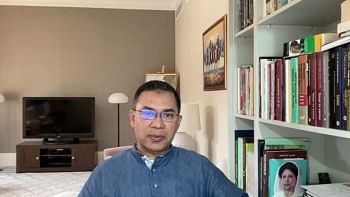Pakistan Law Minister Zahid Hamid resigns

After the weeks-long protest that virtually paralysed the capital and saw several people losing their lives, the government has finally given in to the demands of protesters camped out at Faizabad Interchange with Zahid Hamid resigning as the Federal Law Minister.
The minister's resignation comes in the aftermath of Saturday's botched operation against protesters at Faizabad and 'successful negotiations' with leaders of the demonstration late Sunday night, official sources and state broadcaster PTV say. Six people were killed while hundreds were injured during the operation that was eventually suspended.
Demands agreed to by the government
The government has agreed to the following demands of Tehreek-i-Labaik Ya Rasool Allah (TLY) in order to end the sit-in, according to a document circulating among journalists bearing signatures of the protest leaders and Interior Minister Ahsan Iqbal, among others.
Remove Federal Law Minister Zahid Hamid from his position immediately. "Tehreek-i-Labaik will issue no fatwa [religious decree] of any kind against him."
The report prepared by Raja Zafarul Haq-led committee will be made public within 30 days and whoever is named in the report for being responsible for the change in the election oath will be acted against under the law.
All protesters arrested between November 6 until the end of the sit-in from across the country will be released within one to three days according to legal requirements. The cases registered against them and the house arrests imposed on them will be ended.
An inquiry board will be established to probe and decide what action to take against the government and administration officials over the operation conducted by security forces against protesters on Saturday, November 25. The inquiry should be completed within 30 days and action will be taken against those found responsible.
The federal and provincial governments will determine and compensate for the loss of government and private assets incurred from November 6 until the end of the sit-in.
The points already agreed to concerning the Government of Punjab will be fully implemented.
The document ends by crediting Army Chief Gen Qamar Javed Bajwa and his representative team for their "special efforts" that led to the agreement being signed.
"We are thankful to him [Gen Bajwa] for saving the nation from a big catastrophe," the document concludes.
Besides the interior minister, the document bears the signatures of TLY leader Khadim Hussain Rizvi, Interior Secretary Arshad Mirza, two other protest leaders and Maj Gen Faiz Hameed, who facilitated the agreement.
The law minister's resignation was the chief demand of the agitating parties, who have been staging a protest sit-in — today being its 20th day — in the capital to press the government for his removal.
According to PTV, the minister presented his resignation to Prime Minister Shahid Khaqan Abbasi to bring the country "out of a state of crisis".
Abbasi is expected to accept the minister's resignation later in the day, sources told DawnNews.
"I made the decision to resign in a personal capacity," Hamid was quoted as saying by government sources.
Hamid reiterated that the Elections Act 2017 had been prepared with the consensus of all parliamentary political parties.
The protesters amassed at the Faizabad bridge belong to various 'religious' parties, including the Tehreek-i-Khatm-i-Nabuwwat, Tehreek-i-Labaik Ya Rasool Allah (TLY) and the Sunni Tehreek Pakistan (ST), and had been calling for the sacking of the law minister and strict action against those behind the amendment to the Khatm-i-Nabuwwat oath in the Elections Act 2017 ─ which had earlier been deemed a 'clerical error'.
Containers removed, placed again
Following the agreement, the protest leaders are likely to announce an end to the sit-in at a press conference expected shortly.
The protesters at Faizabad started packing up their belongings and police started removing containers placed around the protest site around 8am. However, the protesters forced authorities to block the area using containers again, saying they will not allow the roads to be opened until the sit-in is formally called off by the protest leaders.
Deciding against using force
On Sunday, the federal government tasked the Punjab Rangers to handle the agitated protesters in Faizabad and other parts of the twin cities of Islamabad and Rawalpindi. Around 1,000 Rangers personnel were deployed in Islamabad.
Earlier, the civil and military leadership had decided against use of force to disperse protesters, during a meeting at the Prime Minister House. Authorities decided to engage protest leaders "with influence" instead, saying the use of force against protesters had been discouraged in favour of a political settlement.
On Saturday, a day-long operation was launched by the Islamabad police, with the help of Frontier Constabulary (FC) personnel and other law enforcement agencies (LEAs), against religious protesters who had all but paralysed the twin cities of Islamabad and Rawalpindi for over a fortnight.
However, the armed operation failed to clear the protesters from Faizabad Interchange. Soon after the operation in the twin cities began, demonstrations broke out in several other cities, while protesters chanted anti-government slogans and blocked major roads. In many areas, protesters attacked LEAs and damaged public property.
After demonstrations spread throughout the country, the civil leadership sought assistance from the armed forces. Chief Of Army Staff Gen Qamar Javed Bajwa flew in from the United Arab Emirates for a meeting chaired by Prime Minister Abbasi, and attended by Interior Minister Ahsan Iqbal and Director-General (DG) Inter-Services Intelligence Naveed Mukhtar at Prime Minister House.
According to military sources, the army chief had opposed use of force against its own people since the population's trust in the institution of the army "can't be compromised for little gains".


 For all latest news, follow The Daily Star's Google News channel.
For all latest news, follow The Daily Star's Google News channel. 



Comments